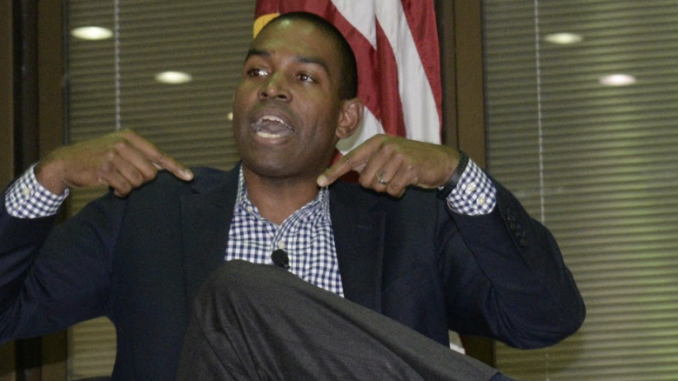
On Thursday, Oct. 10, Congressman Antonio Delgado, D-Rhinebeck, came to SUNY New Paltz to answer questions about public policy. However, about 11 minutes into the event, Delgado was interrupted by protesters from Extinction Rebellion, which is made up of New Paltz residents and students.
The event titled “In Conversation with Congressman Antonio Delgado,” was hosted by the Benjamin Center, from 5:30 to 6:30 p.m. At the event, Delgado was interviewed by Associate Director of the Benjamin Center and Deputy Mayor of the Village of New Paltz KT Tobin. After Delgado answered Tobin’s first question about race, a female protestor stood up from the back of the room and began shouting a speech about the threats posed by climate change, disrupting the event.
Tobin responded by explaining that the public will be allowed to ask Delgado their own questions at the end of the event, but that did not silence the protest. Other members of the crowd shouted “Let her talk!” in response to those trying to silence the woman.
Once one protestor was escorted out or stopped shouting, another one from a different part of the audience would continue.
About 15 minutes into the event, Tobin decided to move on to her question about climate change in attempt to lull the protest.
Before Tobin could finish asking Delgado about climate change, one of the protestors, Steve Greenfield stood up and continued the speech. Greenfield ran against Delgado in the congressional race for the Green Party in the 2018 election.
“Mr. Greenfield, I appreciate you want to get arrested today, but I want everyone to be able to stay in the room for Mr. Delgado’s answer,” Tobin said.
The protesters eventually stopped to listen to Delgado speak.
“We know this younger generation that is coming up behind us is going to inherit this mess,” Delgado said. “I’ve said from day one that I will be for legislation and I will support and champion legislation that does away with any subsides or tax credits that prop up the fossil fuel industry…and I will direct those subsides and tax credits over to renewable energy.”
Delgado was then immediately challenged by the protestors, claiming that he takes campaign money from Exon Mobil, but Delgado denied the claim.
Greenfield was then arrested and escorted out of the multipurpose room for standing up and shouting about how much money Delgado allegedly takes from Exxon.
“That’s your democracy,” Greenfield shouted as he was being removed. “This is what it looks like!”
Delgado’s leading campaign contributor is Akin, Gump, Strauss, Hauer & Feld, a large law firm that gets a quarter of its “lobbying income” from their “top five clients.”
Some of their clients include AT&T, Pohang Iron & Steel, Volkswagen AG, Mobil Oil, Citizens Educational Foundation and Samsung Electronics America.
The Extinction Rebellion members were mainly protesting Delgado’s opposition to the Green New Deal, shouting “support the Green New Deal” throughout the event.
The Green New Deal was introduced on Feb. 7, and is sponsored by Congresswoman Alexandria Ocasio-Cortez, D-Bronx. The bill calls for the U.S. to completely transition to 100% clean energy by 2030.
Delgado has introduced a bill titled the Green Jobs and Opportunity Act to promote more environmentally friendly jobs. According to a handout Extinction Rebellion handed out outside the event, this bill “does nothing to reduce carbon and other greenhouse gas emissions.”
The handout explained that Delgado’s legislation does not align with the 2018 United Nations Intergovernmental Panel on Climate Change (IPCC) report stating that “the world must reach zero carbon by 2030, or face irreversible catastrophic consequences.”
“It’s disingenuous to say [Delgado is] aligning with the IPCC report,” said Eli Campbell, a member of Extinction Rebellion and an alumnus of SUNY New Paltz.
Third-year English and Spanish major Katherine Boyle attended the event and thought the protest was “disrespectful” and distracting.
“The screaming and arrests ended up being very distracting, and I think that that kind of disruption gets in the way of having an intelligent political conversation — especially considering the fact that Delgado expressed his interest in talking to every single activist who disrupted the event,” Boyle said. “I believe that disruptive and inconveniencing activism can be productive and can affect changes in legislation, but I don’t think that this was the time or the place for it to be used.”
“I think activism is absolutely a paramount importance for how we progress in society,” Delgado said. “We need it. What I have to say though, is I am not an activist, I like the work activists do, but I am now in government and I worked my behind off to get in government to figure out what’s going on behind this wall and use the fact that I’m actually there to do whatever I can to advance our shared values and our shared cause. The moment I lose sight of that fact, then I’m not able to maximize the value of the unique position I am in.”

